German film, television and stage actress Wera Frydtberg (1926–2008) was a star of the German cinema of the 1950s. She appeared in leading roles in Ich denke oft an Piroschka/I Often Think of Piroschka (1955) and Wir Wunderkinder/Aren't We Wonderful? (1958).
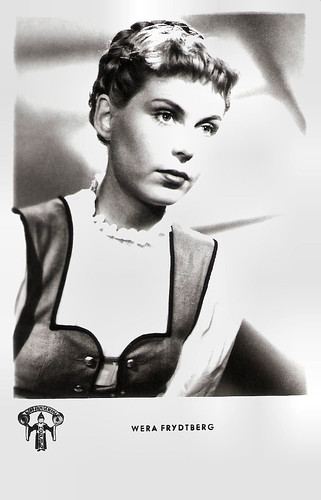
West German postcard by Netter's Starverlag, Berlin, no. A 1201. Photo: Kopp-Filmverleih. Publicity still for Das Kreuz am Jägersteig/The Hunter's Cross (Hermann Kugelstadt, 1954).
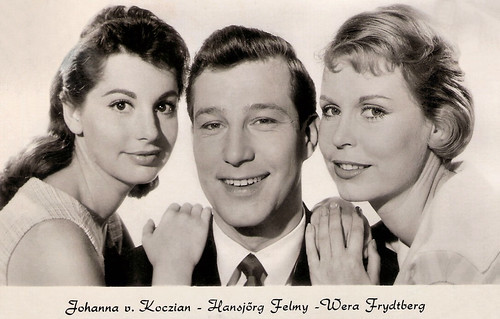
Dutch postcard by Gebr. Spanjersberg N.V., Rotterdam, no. 5338. Sent by mail in the Netherlands in 1960. Photo: HAFBO-film. Publicity still for Wir Wunderkinder/Aren't We Wonderful? (Kurt Hoffmann, 1958) with Johanna von Koczian and Hansjörg Felmy.
Wera Frydtberg was born as Wera Friedberg in 1926 in Freiburg im Breisgau, Germany. Her father was a physician. She studied acting with Professor Neugebauer in Vienna. Wera made her theatrical debut in 1949 and became prominent in the Wirtschaftwunder cinema of the 1950s.
She made her film debut in a supporting part in the melodramatic Film Noir Die Sünderin/The Sinner (Willi Forst, 1951). In her role as a prostitute, leading star Hildegard Knef created a sensation with a brief nude scene. The film drew the criticism of the Roman Catholic Church. Contrary to common belief in later years, at the time of the release the nude scene was not the main issue for the protests but the depiction of prostitution, euthanasia and suicide as a good or even logical way to act. The opposition reached the degree of banning the film and scandalising it which paradoxically made it one of the landmarks in the history of German cinema.
In the following years, Frydtberg played supporting parts in several comedies and had a guest role in the American-German TV series Flash Gordon (1954) featuring Steve Holland as the space hero. Frydtberg had her first leading role in the Heimatfilm Das Forsthaus in Tirol/The Forest House in Tyrol (Hermann Kugelstadt, 1955) opposite Helmuth Schneider.
Very popular was the charming and melancholic comedy Ich denke oft an Piroschka/I Often Think of Piroschka (Kurt Hoffmann, 1955), in which she co-starred with Liselotte Pulver as Piroschka and Gunnar Möller. During a train journey, the writer Andreas nostalgically recalls a holiday trip he had made thirty years before in 1920s Hungary to the Lake Balaton area. While there he had enjoyed his first true romance with the daughter of the local stationmaster. The film is in the Heimatfilm tradition which was at its height when Ich denke oft an Piroschka was released.
Other notable films with Frydtberg include the comedy Der Pauker/The Crammer (Axel von Ambesser, 1958), starring Heinz Rühmann, and Wir Wunderkinder/Aren't We Wonderful? (Kurt Hoffmann, 1958), with Johanna von Koczian and Hansjörg Felmy. The latter recounts the lives of two schoolmates, Hans Boeckel and Bruno Tiches from the fictional town of Neustadt an der Nitze, against the backdrop of German history in the first half of the 20th century. Eleanor Mannikka at AllMovie: "A biting and effective semi-experimental film about Nazism in Germany, director Kurt Hoffmann tells the story in a long flashback, starting in 1913 and playing out like a silent movie on a small screen." The film received numerous awards. Most notably, it won the Golden Globe for Best International Picture in 1960.
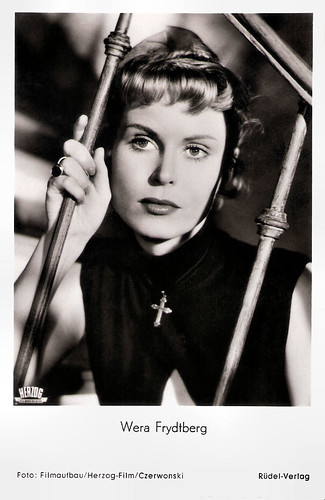
German postcard by Rüdel-Verlag, Hamburg-Bergedorf, no. 984. Photo: Filmaufbau / Herzog-Film / Czerwonski. Publicity still for Sie/She (Rolf Thiele, 1954).
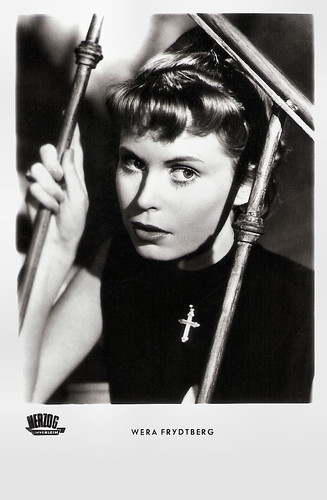
German postcard by Netter's Starverlag, Berlin, no. A 1205. Photo: Herzog Filmverleih. Publicity still for Sie/She (Rolf Thiele, 1954).
During the 1960s, Wera Frydtberg focused more on TV and appeared in operetta adaptations such as Der Vogelhändler/The Bird Seller (Kurt Wilhelm, 1960) and Das Land des Lächelns/The Land of Smiles (Kurt Wilhelm, 1961).
During her career, she also appeared extensively on stage in Vienna at the Akademie-Theater, the Kosmos-Theater and till 1962 at the Theater in der Josefstadt. In Germany, she played guest parts at the Renaissance-Theater in Berlin, the Komödie Berlin, at the Kleine Komödie in Munich, at the Komödie Düsseldorf, at the Theater Die Kleine Freiheit in Munich and at the Schlosspark-Spielen Wiesbaden.
In the cinema, she appeared in such mediocre fare as the Austrian Schlagerfilm Sing, aber spiel nicht mit mir/Sing but Don’t Play with Me (Kurt Nachmann, 1963) with Adrian Hoven. More interesting was the drama Das Glück läuft hinterher/Happiness is Running Afterwards (Peter Beauvais, 1963), which follows the life of several different people in the 1960s in Germany for a few days.
She guest-starred in popular Krimi series like Der Kommissar/The Commissioner (1972-1973) and Ein Fall für zwei/A case for two (1982). Her final feature film was the comedy Mein Onkel Theodor oder Wie man viel Geld im Schlaf verdient/My Uncle Theodor (Gustav Ehmck, 1975) with Gert Fröbe and Barbara Rütting. Her last screen appearance was in the Krimi series München 7/Munich 7 (2006).
Wera Frydtberg died in 2008 in Munich, Bavaria, Germany at 81. She married American immigrant and officer Otto Urbach until he died in 1976. They had one daughter, historian Karina Urbach.
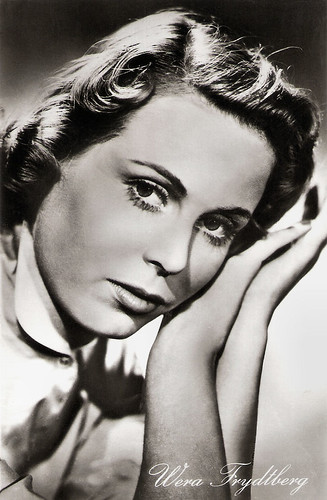
East-German postcard by VEB Progress Film-Vertrieb, Berlin, no. 34/327, 1957. Photo: Real-Film. Publicity still for Die tolle Lola/The Great Lola (Hans Deppe, 1954).
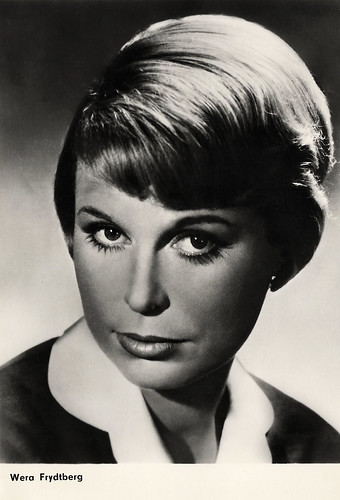
East-German postcard by VEB Progress Film-Vertrieb, Berlin, no. 1061, 1965.
Sources: Eleanor Mannikka (AllMovie), Stephanie D’heil (Steffi-Line - German), Wikipedia (German and English) and IMDb.
This post was last updated on 20 April 2024.

West German postcard by Netter's Starverlag, Berlin, no. A 1201. Photo: Kopp-Filmverleih. Publicity still for Das Kreuz am Jägersteig/The Hunter's Cross (Hermann Kugelstadt, 1954).

Dutch postcard by Gebr. Spanjersberg N.V., Rotterdam, no. 5338. Sent by mail in the Netherlands in 1960. Photo: HAFBO-film. Publicity still for Wir Wunderkinder/Aren't We Wonderful? (Kurt Hoffmann, 1958) with Johanna von Koczian and Hansjörg Felmy.
The sinner
Wera Frydtberg was born as Wera Friedberg in 1926 in Freiburg im Breisgau, Germany. Her father was a physician. She studied acting with Professor Neugebauer in Vienna. Wera made her theatrical debut in 1949 and became prominent in the Wirtschaftwunder cinema of the 1950s.
She made her film debut in a supporting part in the melodramatic Film Noir Die Sünderin/The Sinner (Willi Forst, 1951). In her role as a prostitute, leading star Hildegard Knef created a sensation with a brief nude scene. The film drew the criticism of the Roman Catholic Church. Contrary to common belief in later years, at the time of the release the nude scene was not the main issue for the protests but the depiction of prostitution, euthanasia and suicide as a good or even logical way to act. The opposition reached the degree of banning the film and scandalising it which paradoxically made it one of the landmarks in the history of German cinema.
In the following years, Frydtberg played supporting parts in several comedies and had a guest role in the American-German TV series Flash Gordon (1954) featuring Steve Holland as the space hero. Frydtberg had her first leading role in the Heimatfilm Das Forsthaus in Tirol/The Forest House in Tyrol (Hermann Kugelstadt, 1955) opposite Helmuth Schneider.
Very popular was the charming and melancholic comedy Ich denke oft an Piroschka/I Often Think of Piroschka (Kurt Hoffmann, 1955), in which she co-starred with Liselotte Pulver as Piroschka and Gunnar Möller. During a train journey, the writer Andreas nostalgically recalls a holiday trip he had made thirty years before in 1920s Hungary to the Lake Balaton area. While there he had enjoyed his first true romance with the daughter of the local stationmaster. The film is in the Heimatfilm tradition which was at its height when Ich denke oft an Piroschka was released.
Other notable films with Frydtberg include the comedy Der Pauker/The Crammer (Axel von Ambesser, 1958), starring Heinz Rühmann, and Wir Wunderkinder/Aren't We Wonderful? (Kurt Hoffmann, 1958), with Johanna von Koczian and Hansjörg Felmy. The latter recounts the lives of two schoolmates, Hans Boeckel and Bruno Tiches from the fictional town of Neustadt an der Nitze, against the backdrop of German history in the first half of the 20th century. Eleanor Mannikka at AllMovie: "A biting and effective semi-experimental film about Nazism in Germany, director Kurt Hoffmann tells the story in a long flashback, starting in 1913 and playing out like a silent movie on a small screen." The film received numerous awards. Most notably, it won the Golden Globe for Best International Picture in 1960.

German postcard by Rüdel-Verlag, Hamburg-Bergedorf, no. 984. Photo: Filmaufbau / Herzog-Film / Czerwonski. Publicity still for Sie/She (Rolf Thiele, 1954).

German postcard by Netter's Starverlag, Berlin, no. A 1205. Photo: Herzog Filmverleih. Publicity still for Sie/She (Rolf Thiele, 1954).
The land of smiles
During the 1960s, Wera Frydtberg focused more on TV and appeared in operetta adaptations such as Der Vogelhändler/The Bird Seller (Kurt Wilhelm, 1960) and Das Land des Lächelns/The Land of Smiles (Kurt Wilhelm, 1961).
During her career, she also appeared extensively on stage in Vienna at the Akademie-Theater, the Kosmos-Theater and till 1962 at the Theater in der Josefstadt. In Germany, she played guest parts at the Renaissance-Theater in Berlin, the Komödie Berlin, at the Kleine Komödie in Munich, at the Komödie Düsseldorf, at the Theater Die Kleine Freiheit in Munich and at the Schlosspark-Spielen Wiesbaden.
In the cinema, she appeared in such mediocre fare as the Austrian Schlagerfilm Sing, aber spiel nicht mit mir/Sing but Don’t Play with Me (Kurt Nachmann, 1963) with Adrian Hoven. More interesting was the drama Das Glück läuft hinterher/Happiness is Running Afterwards (Peter Beauvais, 1963), which follows the life of several different people in the 1960s in Germany for a few days.
She guest-starred in popular Krimi series like Der Kommissar/The Commissioner (1972-1973) and Ein Fall für zwei/A case for two (1982). Her final feature film was the comedy Mein Onkel Theodor oder Wie man viel Geld im Schlaf verdient/My Uncle Theodor (Gustav Ehmck, 1975) with Gert Fröbe and Barbara Rütting. Her last screen appearance was in the Krimi series München 7/Munich 7 (2006).
Wera Frydtberg died in 2008 in Munich, Bavaria, Germany at 81. She married American immigrant and officer Otto Urbach until he died in 1976. They had one daughter, historian Karina Urbach.

East-German postcard by VEB Progress Film-Vertrieb, Berlin, no. 34/327, 1957. Photo: Real-Film. Publicity still for Die tolle Lola/The Great Lola (Hans Deppe, 1954).

East-German postcard by VEB Progress Film-Vertrieb, Berlin, no. 1061, 1965.
Sources: Eleanor Mannikka (AllMovie), Stephanie D’heil (Steffi-Line - German), Wikipedia (German and English) and IMDb.
This post was last updated on 20 April 2024.
No comments:
Post a Comment